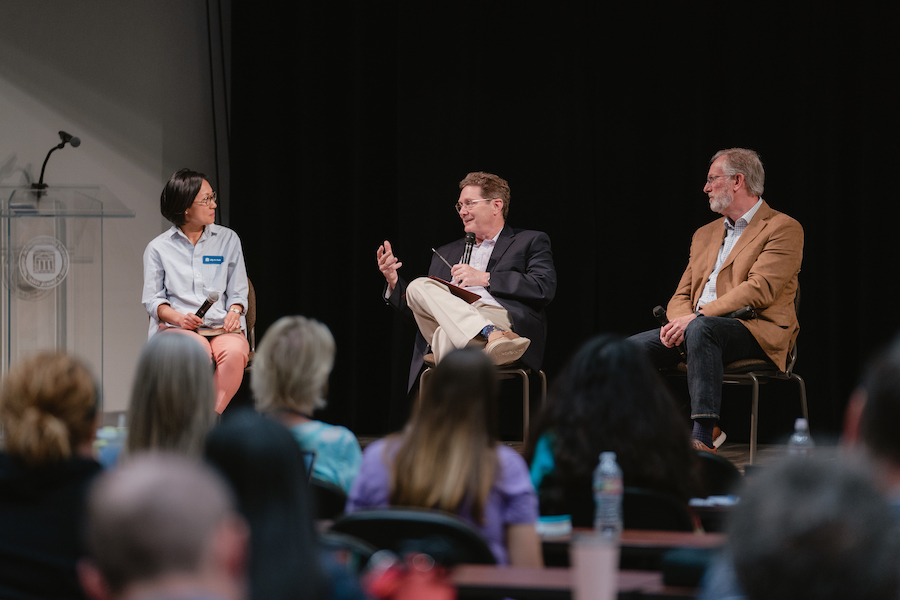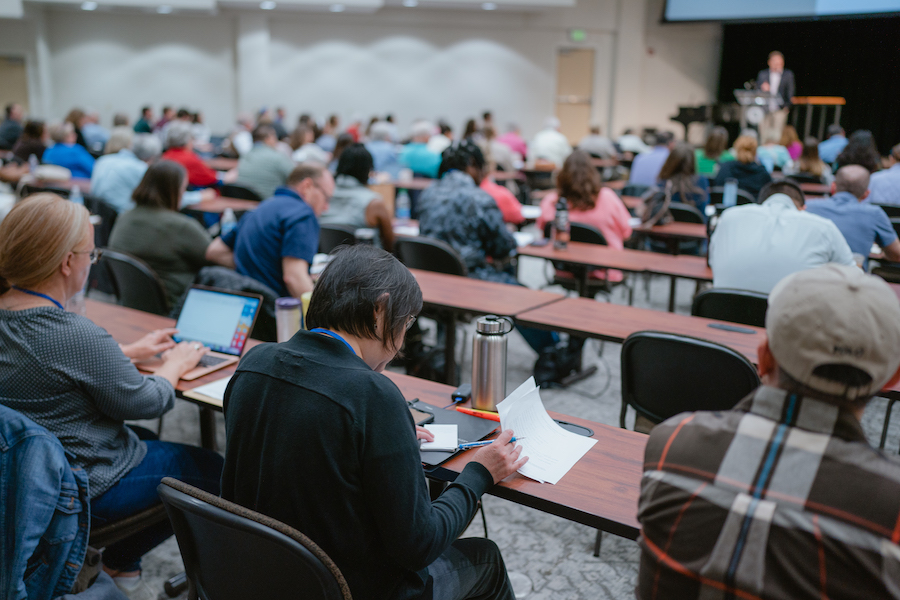Gospel-Centered Counseling Conference focuses on grief, suffering

In dealing with people who are grieving, a pastor must study two books: the Bible, and “the book of the human heart,” Ed Welch said, adding they must know people nearly as well as they know Scripture.
Welch, a faculty member and counselor at the Christian Counseling & Educational Foundation (CCEF), spoke at the Southwestern Baptist Theological Seminary Gospel-Centered Counseling Conference held April 4-5 on the Fort Worth campus. The two-day conference focused on using biblical principles to help those who are grieving or suffering.
The first night of the conference focused on theology. Lilly Park, associate professor of biblical counseling in the Jack D. Terry School of Educational Ministries at Southwestern, told attendees that people don’t hear enough about theology, so they turn to other things when suffering. Park organized the conference, which was offered to students, pastors, church leaders, and counselors.
Welch and Stuart Scott, executive director of One-Eighty Ministries, spoke during the event’s plenary sessions and in a panel discussion moderated by Park. The conference also included what Scott called “a biblical theology of suffering” presented by Stephen Yuille, professor of church history and spiritual formation in the School of Theology at Southwestern.
Scott spoke of the paradox of “both and,” explaining biblical examples of being both sorrowful and rejoicing as in John 16:22. Based on passages from Paul’s letters to the Thessalonians, he said it takes trust that events in people’s lives are ordained by God and that the best of times can be in the worst of times.

Attendees of the two-day Gospel-Centered Counseling Conference sponsored by Southwestern Baptist Theological Seminary learned biblical principles to help those who are grieving and suffering from Stuart Scott, executive director of One-Eighty Ministries, and Ed Welch, a faculty member and counselor at the Christian Counseling & Educational Foundation (CCEF), during the April 4-5 event held on the campus of the Fort Worth-based institution.
Scott said that when he was going through difficulties, some people would offer counseling right away. One friend, however, simply noted that it was a hard time, which Scott said was “the best thing he could’ve said.” If believers immediately go to, “Well, God is sovereign,” the statement is true, but it’s not always comforting, he said.
During the panel discussion, Park asked each speaker to share his testimony. She also noted that counseling can be hard on the counselor as well and asked how they persevere. Welch said it can be difficult to talk to people whose lives have been wrecked yet they still refuse to turn to Christ. However, he said, “I am honored to care for people.”
Scott replied that if God is leading you into a place of counseling, He will give you the grace to do it. Prayer is “a really big component” of caring for others, he added.
Welch spoke during the closing session, noting that every grieving person hears hurtful and thoughtless words, noting that it can change their lives and will change the body of Christ as they pull away from the church.
“From my perspective, we don’t seem to be gaining ground,” he said, adding that people seem to have come out of the COVID-19 pandemic with fewer interpersonal skills. He noted that any sentence that begins with “At least” – as in, “At least her suffering is over,” – is “something you’ll have to ask forgiveness for.”
Welch said the guide for offering comfort and counseling to those who are grieving should be to seek words that contain “wisdom that rests on compassion and humility.” He defined compassion as “Love that is unmistakable; love that is evident.” Humility, he said, is acknowledging that believers live under God and need to hear His Word, and when they hear His Word, they respond.
Welch then asked attendees for their “apt words for humility,” beginning with what they would say at the beginning of someone’s grief.
“Silence is not an option,” he said, adding that a phrase such as “So sorry you’re going through this” would be appropriate. “Listen to them” as they talk about grieving their loss, he said. Tell them, “Here is a verse I’ve been praying for you.”
Long-term expressions of love and humility include reading Scripture with those who are grieving, and praying together.
“The greatest apologetic of the church is that the world would see people coming together,” he said.



